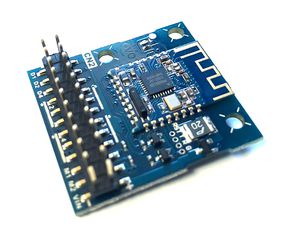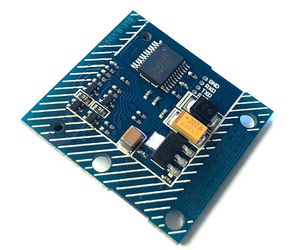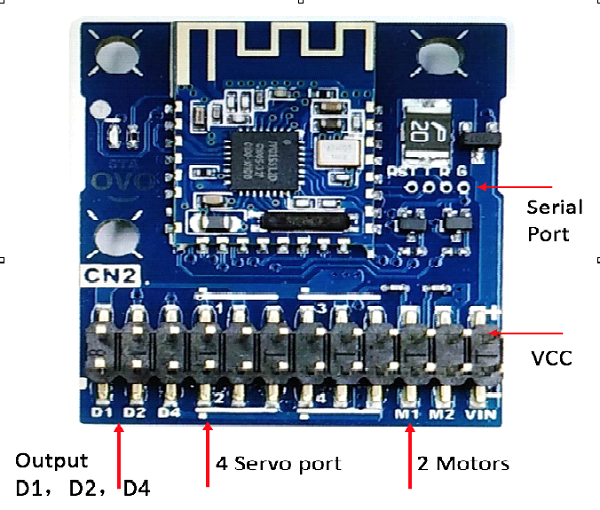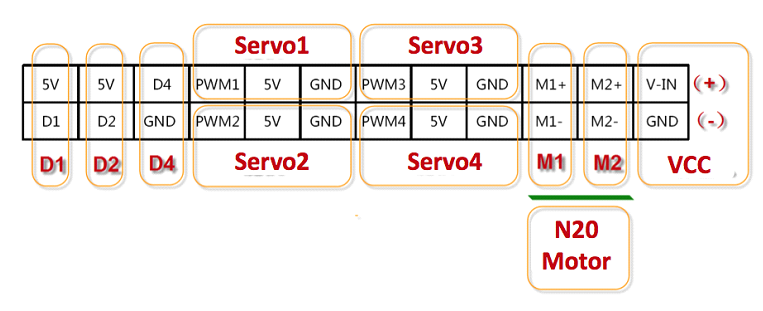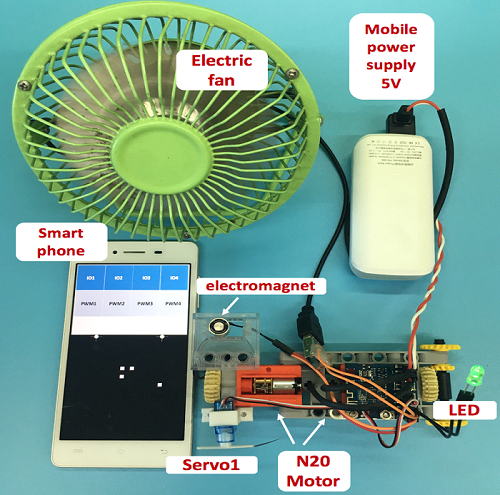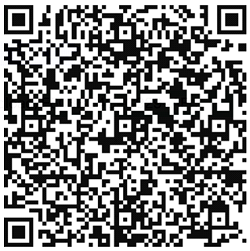Difference between revisions of "BPI-BT BLE 4.2 control module"
(→Main interface description) |
(→Resources) |
||
| (17 intermediate revisions by the same user not shown) | |||
| Line 8: | Line 8: | ||
=Hardware= | =Hardware= | ||
| + | ==Hardware interface== | ||
| + | [[File:BPI-BT_BLE_4.2_control_board_interface.png]] | ||
==hardware spec== | ==hardware spec== | ||
| Line 33: | Line 35: | ||
==Main interface description== | ==Main interface description== | ||
*name is also marked on the PCB board | *name is also marked on the PCB board | ||
| + | |||
| + | [[File:BPI-BT_BLE_4.2_control_board_8.png]] | ||
| + | |||
{| class="wikitable" | {| class="wikitable" | ||
|- | |- | ||
| − | | style="background: PaleTurquoise; color: black" colspan="4"| '' | + | | style="background: PaleTurquoise; color: black" colspan="4"| ''Main interface description of BPI-BT BLE 4.2 control module'' |
|- | |- | ||
|Name ||Description | |Name ||Description | ||
| Line 45: | Line 50: | ||
|D4 ||Output 3.3v high and low level, weak current, can connect LED lamp. IO port 4 control. | |D4 ||Output 3.3v high and low level, weak current, can connect LED lamp. IO port 4 control. | ||
|- | |- | ||
| − | |1,2,3,4 ||PWM output, control pulse port 1,2,3,4 through software. The duty ratio can be set, which can be used to control the steering gear Angle, to adjust the motor speed, to make the breathing lamp (gradually increasing and decreasing), or to be used as the driving square wave output of the stepping motor module. | + | |1,2,3,4, ||PWM output, control pulse port 1,2,3,4 through software. The duty ratio can be set, which can be used to control the steering gear Angle, to adjust the motor speed, to make the breathing lamp (gradually increasing and decreasing), or to be used as the driving square wave output of the stepping motor module. |
|- | |- | ||
|M1 ||Motor drive port, double up and down. Control direction by software IO port 3 and speed by pulse port 3 | |M1 ||Motor drive port, double up and down. Control direction by software IO port 3 and speed by pulse port 3 | ||
| Line 51: | Line 56: | ||
|M2 ||Motor drive port, double up and down. Control direction by software IO port 4 and speed by pulse port 4 | |M2 ||Motor drive port, double up and down. Control direction by software IO port 4 and speed by pulse port 4 | ||
|- | |- | ||
| − | | | + | | + ||Power positive terminal, use DuPont port. Maximum current 2A. |
| − | |||
| − | |||
|- | |- | ||
| − | | | + | | - ||Negative power supply. Use the DuPont port. |
| − | |||
|- | |- | ||
| − | |R | + | |T,R,G, ||The serial port sends, receives, GND interface and does not weld connectors. When the user needs, he/she can weld lines or connect them with probes. The data of smart phone can be output to the serial port through Bluetooth transmission mode for external modules to use. |
| − | |||
| − | |||
|- | |- | ||
|} | |} | ||
| + | |||
| + | ==Typical application scenario== | ||
| + | |||
| + | [[File:BPI-BT_BLE_4.2_control_board_9.png]] | ||
| + | |||
| + | =Resources= | ||
| + | |||
| + | *Banana PI BPI-ovo robort with BP-BLE 4.2 bluetooth control module:https://www.youtube.com/watch?v=Zo9up7As6j4&feature=youtu.be | ||
| + | |||
| + | =BPI-BT BLE 4.2 control module for OVO robot= | ||
| + | |||
| + | *Step 1: go to http://www.ovorobot.com and download the ovorobot APP. | ||
| + | *Step 2: through scan function in the APP, scan the following qr code to download the bluetooth module control applet. After running the small program, you can control the bluetooth control module port. | ||
| + | ::::[[File:BPI-BT_BLE_4.2_control_board_10.png]] | ||
| + | *Step 3: visit the following link through the browser to view the block code of the small program. Learn the control method of Bluetooth control module according to the code test function. | ||
| + | ::http://www.ovorobot.com/blockly.html - -i2RJUsjocCXsLqGCs5H | ||
| + | *Step 4: write your own small programs by online developing environment, and control the Bluetooth control module to realize your own creative functions. Help can be found at the help center | ||
| + | ::http://www.ovorobot.com/contactus.html | ||
| + | ::Note: For non-Chinese users, please contact WeChat 13891815955 for English support. | ||
Latest revision as of 23:10, 15 August 2018
Contents
Introduction
BPI-BT BLE 4.2 control module is a kind of maker product of wireless bluetooth intelligent control. It supports bluetooth BLE4.2 protocol. Through the connection of smart phone BLE bluetooth, it can control LED lights, N20 motor, micro-steering machine, relay, electromagnet and other low-voltage devices, which facilitates the makers to realize their creativity.
BPI-BT BLE 4.2 control module is a wireless Bluetooth product, supporting Bluetooth BLE4.2 protocol, via smartphones BLE Bluetooth connection, with the aid of the ovorobot graphical development platform and the APP can be external control LED lights, N20 motor, micro servo, relay, electromagnet low voltage devices, such as convenient and maker realize their ideas. The interface of pass-through serial port is reserved. Users who need further DIY can upload the data of mobile phone to their control unit.
Hardware
Hardware interface
hardware spec
| Hardware Specification of BPI-BT BLE 4.2 control module | |||
| name | parameter | explain | |
| operating frequency | 2.4G | ||
| operating voltage | 3.7~6V | It is recommended to use the 2A battery pack, or 4 section 5 dry batteries. | |
| operating temperature | -40℃ - 80℃ | ||
| transmission range | 60m | Open field data.Indoor transmission will be reduced. | |
| bluetooth | BLE 4.2 | ||
| size | 32mm x 35mm x 14mm | 3 M3 fixed holes are left, and the hole spacing is compatible with lego brick hole spacing, which is convenient to be fixed with M3 flat head screw. | |
Main interface description
- name is also marked on the PCB board
| Main interface description of BPI-BT BLE 4.2 control module | |||
| Name | Description | ||
| D1 | The maximum current is 200mA, and the ground (GND) is connected after conduction. Can connect low current motor. IO port 1 control. | ||
| D2 | The maximum current is 200mA, and the ground (GND) is connected after conduction. Can connect low current motor. IO port 2 control. | ||
| D4 | Output 3.3v high and low level, weak current, can connect LED lamp. IO port 4 control. | ||
| 1,2,3,4, | PWM output, control pulse port 1,2,3,4 through software. The duty ratio can be set, which can be used to control the steering gear Angle, to adjust the motor speed, to make the breathing lamp (gradually increasing and decreasing), or to be used as the driving square wave output of the stepping motor module. | ||
| M1 | Motor drive port, double up and down. Control direction by software IO port 3 and speed by pulse port 3 | ||
| M2 | Motor drive port, double up and down. Control direction by software IO port 4 and speed by pulse port 4 | ||
| + | Power positive terminal, use DuPont port. Maximum current 2A. | ||
| - | Negative power supply. Use the DuPont port. | ||
| T,R,G, | The serial port sends, receives, GND interface and does not weld connectors. When the user needs, he/she can weld lines or connect them with probes. The data of smart phone can be output to the serial port through Bluetooth transmission mode for external modules to use. | ||
Typical application scenario
Resources
- Banana PI BPI-ovo robort with BP-BLE 4.2 bluetooth control module:https://www.youtube.com/watch?v=Zo9up7As6j4&feature=youtu.be
BPI-BT BLE 4.2 control module for OVO robot
- Step 1: go to http://www.ovorobot.com and download the ovorobot APP.
- Step 2: through scan function in the APP, scan the following qr code to download the bluetooth module control applet. After running the small program, you can control the bluetooth control module port.
- Step 3: visit the following link through the browser to view the block code of the small program. Learn the control method of Bluetooth control module according to the code test function.
- http://www.ovorobot.com/blockly.html - -i2RJUsjocCXsLqGCs5H
- Step 4: write your own small programs by online developing environment, and control the Bluetooth control module to realize your own creative functions. Help can be found at the help center
- http://www.ovorobot.com/contactus.html
- Note: For non-Chinese users, please contact WeChat 13891815955 for English support.
